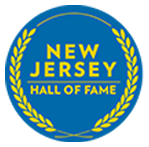Milton Friedman
Economist and Nobel Prize winner
Born: July 31, 1912, in Brooklyn, New York
Grew up in: Rahway, New Jersey
Died: November 16, 2006, in San Francisco
New Jersey Hall of Fame, Class of 2019-20: Public Service
As a high-profile proponent of free-market economics, Milton Friedman has been a major influence on conservative thinking and U.S. financial policy—including taxation and deregulation—for more than four decades.
The child of Eastern European immigrants, Friedman was raised in Rahway, graduating from Rahway High School in 1928. During his formative years, “financial crisis was a constant companion,” he wrote in his Nobel Prize autobiography. Friedman attended Rutgers University on a competitive scholarship, initially studying mathematics, but then gravitating to economics.
Upon graduation from Rutgers in 1932, Friedman was offered a scholarship to study economics at the University of Chicago; he later completed a fellowship at Columbia University. It was at the University of Chicago that Friedman met his future wife, Rose, a fellow economics student, who became a partner in much of his subsequent work.
Friedman began his professional career as a researcher in Washington, D.C., during the administration of Franklin D. Roosevelt. The experience gave Friedman a closeup look at New Deal programs and helped shape his disdain for government intervention as a cure for economic ills. From 1941-1943, Friedman worked on wartime tax policy at the U.S. Treasury Department, where he helped establish a system of payroll tax withholding—an innovation he eventually regretted as enabling big government. Later during the war years, he worked as a statistician on projects relating to weapon design and military tactics.
Following the war, Friedman joined the faculty at the University of Chicago, which became his longtime academic home. He also served on the National Bureau of Economic Research, where he studied monetary history. In the coming decades, Friedman published influential books, scholarly articles and magazine columns espousing his theories about consumer consumption, monetary policy, and the role of free markets in promoting democracy.
Having established himself as a favorite of small-government conservatives, Friedman served as an economic advisor to Republican presidential candidate Barry Goldwater in 1964, and on Richard Nixon’s successful presidential campaign of 1968. He was an unofficial advisor to Ronald Reagan during his 1980 presidential campaign, and served on the President’s Economic Advisory Board during the Reagan presidency. In 1988, Reagan awarded Friedman the Presidential Medal of Freedom.
Targets of Friedman’s criticism included the Federal Reserve Board, progressive taxation, minimum-wage laws and the social safety net, including social security, which he believed encouraged dependence on government relief. Beyond economic policy, Friedman argued against the military draft (which ended in 1973), and promoted school vouchers as a means of parental choice in education. As a libertarian, he favored decriminalization of recreational drugs and supported gay rights.
Friedman won his Nobel Memorial Prize for Economics in 1976 for “achievements in the fields of consumption analysis, monetary history and theory and for his demonstration of the complexity of stabilization policy.”
